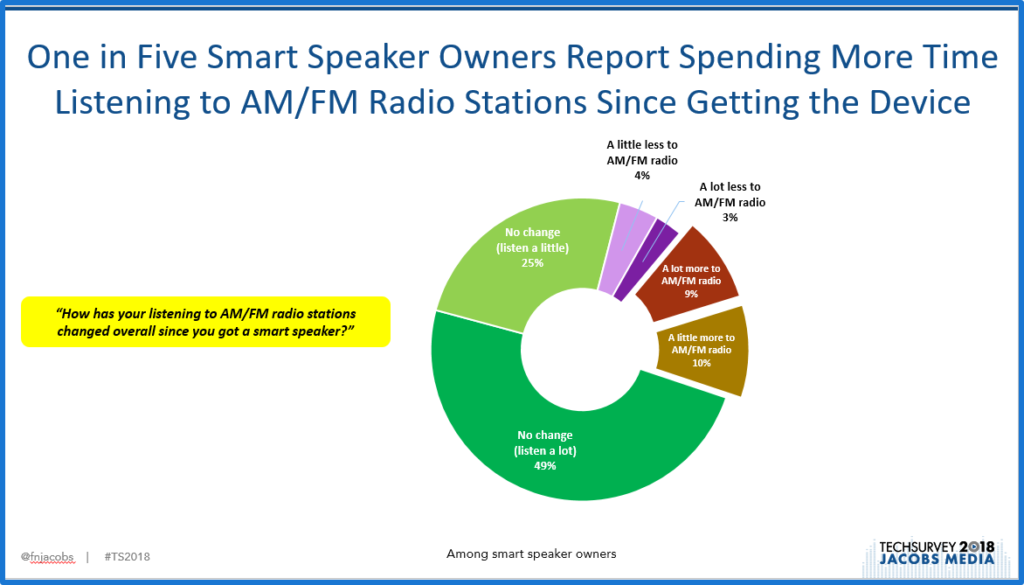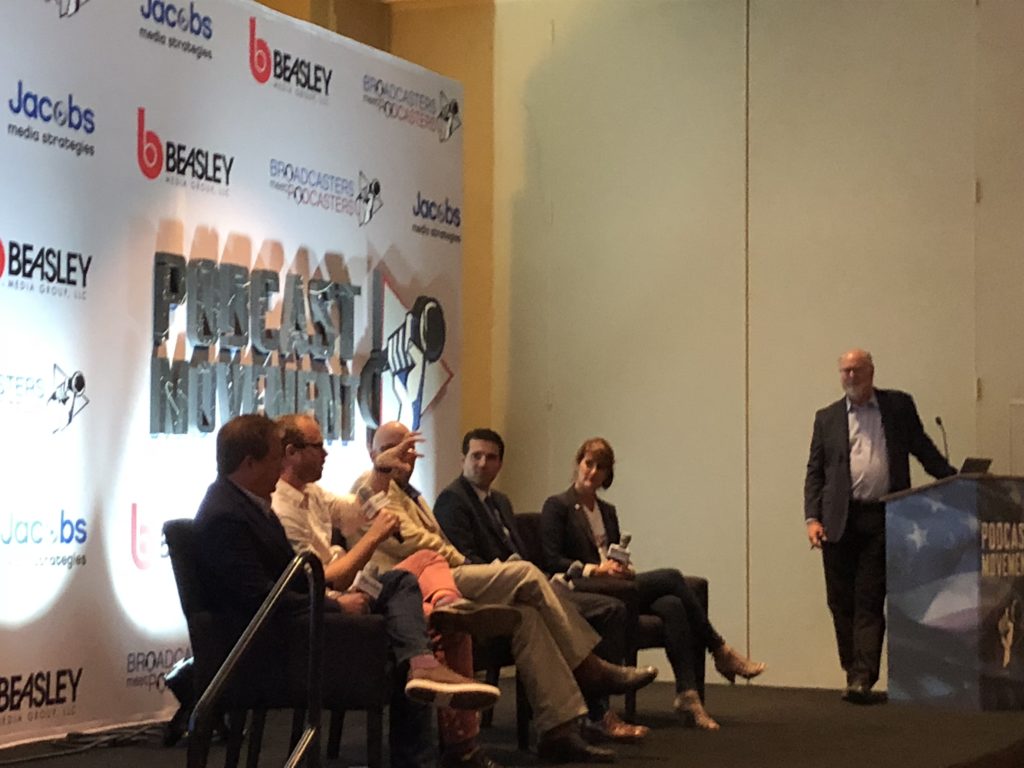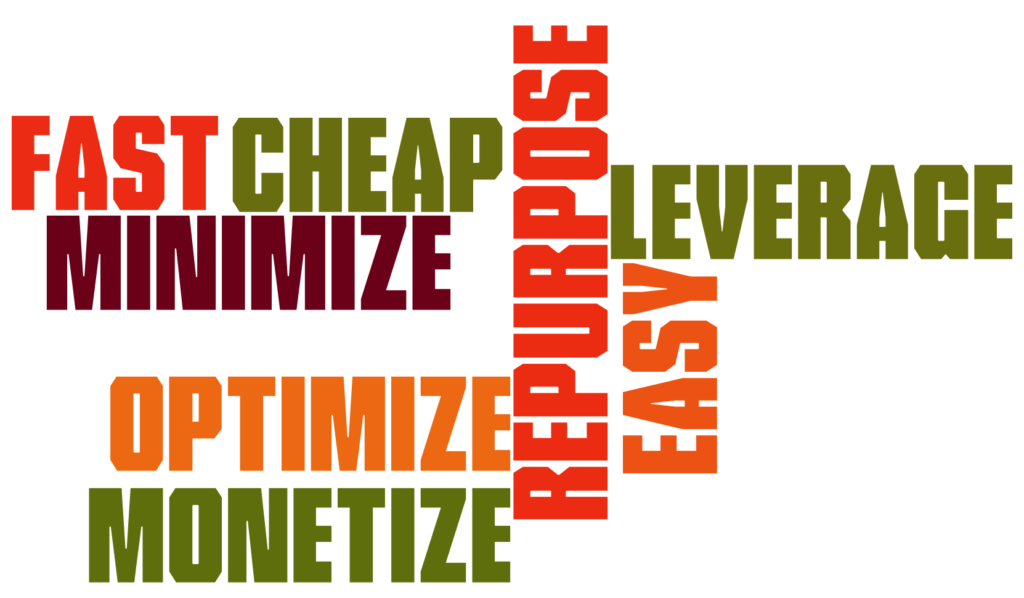Alexa, Do You Help Or Hurt Radio?
Since Amazon's Echo device dropped two years ago, the debate has been raging over whether or not these these voice command devices will help or hurt broadcast radio. Here we try to answer this question by taking a close look at the numbers.
___________________________
Guest post by Fred Jacobs of Jacobs Media
Since the Amazon Echo hit the scene a couple short years back, there’s been all sorts of speculation about whether the advent of these voice command devices will be a plus – or a minus – for broadcast radio.
And for good reasons. The growth of smart speakers in this country is moving at iPhone speed. Edison and NPR’s recently released Smart Audio Report reports that 18% of Americans own one of these devices. Our Techsurvey – among more than 64,000 broadcast radio listeners – pegs smart speaker penetration at 21%.
We’re obviously talking about a platform that’s experiencing a growth spurt – with no end in sight. Amazon has a healthy lead over Google – and is trouncing Apple – in the smart speaker sweepstakes. And the market leader is doing everything it can to embed its Alexa voice technology in all sorts of gadgets – including cars.
Both Edison and our Jacobs Techsurvey’s also agree on the disappearance of radios at home – at an alarming rate. Our study shows that only 83% of our radio-centric sample has a radio the use in their domicile – whether it’s a house, apartment, condo, or dormitory. It’s an even more dire picture among Millennials – only two-thirds of whom have a working radio they use where they live.
So, you’d think the proliferation of smart speakers in people’s home could potentially be a boon to broadcasters. Not so fast, says Radio World, reporting on the NPR/Edison study.
In an article titled “Smart Speaker Owners Listen ot More Audio (But Not Necessarily Radio,” Emily Reigart writes how 40% of First Adopters (of smart speakeres) as well as 45% of Early Mainstream users say Alexa (and similar devices) is replacing quarter-hours formerly spent with broadcast radio.
Our Techsurvey sample, however, indicates that people already predisposed to radio are actually spending more time listening to their favorite stations.

In fact, nearly one-fifth (19%) of smart speaker owners report listening to a lot more/a little more AM/FM radio, compared to 7% whose radio time has decreased. That’s a net gain of 12%, and a hopeful sign that among solid radio listeners, devices like the Amazon Echo and Google Home are actually additive. Given that most of these devices have made their way into homes, there’s reason for optimism.
But the NPR/Edison study is also a warning to stations to not count their digital chickens before they hatch. When it comes to smart speakers, audio consumption definitely increases. But ensuring radio is one of the celebrants is far from a given. In fact, their data and ours suggests that while core radio listeners will ask Alexa to tune in Z100, WTOP, and WCSX, many others will be enjoying music and audio from other sources.
Will podcasts enjoy an Alexa-based surge in listening? The NPR/Edison study sugggests they may not. Our smart speaker panel at Podcast Movement on Wednesday was more hopeful. Moderated by AmpliFi Media’s Steve Goldstein, it was the only session devoted to smart speakers, “Alexa, Play Me A Podcast.”
And while it focused on the marriage of podcasting and those small gadgets that are rapidly gaining momentum on kitchen islands and nightstands, the group that featured Spoken Layer’s Will Mayo, Midroll’s Rob McCracken, jacapps’ Bob Kernen, Beasley’s Justin Chase, and NPR’s Meg Goldthwaite talked expansively about the smart speaker opportunity for radio, streaming, and podcasting.
The group pointed out how these now-familiar gadgets are just the tip of the iceberg – that the trend is more about voice and how that technology is being embedded into myriad gadgets, from cars to TV remotes to steam ovens.

As for whether they enhance radio listening or erode, Goldthwaite told the standing room only crowd, “It’s accretive to our streaming efforts.” So there. And Chase echoed that thought nothing that smart speakers represented “audience addition” and that radio listeners “are using our audio in new places.”
Our mobile app development company has a smart speaker arm – SonicAi – and so Bob Kernen is all to familiar with the challenges – and opportunities – posed by this space. His conclusion?
“Alexa’s not that smart.”
And that’s a reminder to broadcasters – and podcasters – about how consumers need to learn the language. And radio needs to do more than mail in their skills.
Mark Ramsey‘s wonderful presentation at our “Broadcasters Meet Podcasters” track came with a warning for would-be podcast producers. He noted that anytime you hear one of the terms in the word cloud below about podcasting, it’s time to call B.S.

I would submit these same cautionary words apply to smart speaker skill development. There’s no simple pathway to success for broadcast radio. Skill development requires research, strategy, investment, marketing, and time. No one in radio is going to flip a switch and start repaing bushels full of quarter-hours.
But strongly branded stations have a leg up over the competition – as they do in just about every sector. Their regular listeners have the strongest potential to provide added benefit as more and more smart speakers end up in homes, workbenches, and cubicles.
Spoken Layer’s Will Mayo reminded the room that when it comes to smart speaker and voice technology, “We’re in the sandbox now.” And Ramsey reinterated that we’re just out of the first inning in this emerging space. There’s a lot of game to be played, and for radio, this is a playoff game.
As radio learned – oftentimes the hard and painful way – with mobile app development, solutions aren’t simple or cheap, and making a meaningful impact on smartphones doesn’t come with a paint-by-numbers kit.
Come to think of it, I’m going to ask Mark to add “best practices” to his word cloud.
There are none.
Jacobs Media has consistently walked the walk in the digital space, providing insights and guidance through its well-read national Techsurveys.
In 2008, jacapps was launched – a mobile apps company that has designed and built more than 1,200 apps for both the Apple and Android platforms. In 2013, the DASH Conference was created – a mashup of radio and automotive, designed to foster better understanding of the "connected car" and its impact.
Along with providing the creative and intellectual direction for the company, Fred consults many of Jacobs Media's commercial and public radio clients, in addition to media brands looking to thrive in the rapidly changing tech environment.